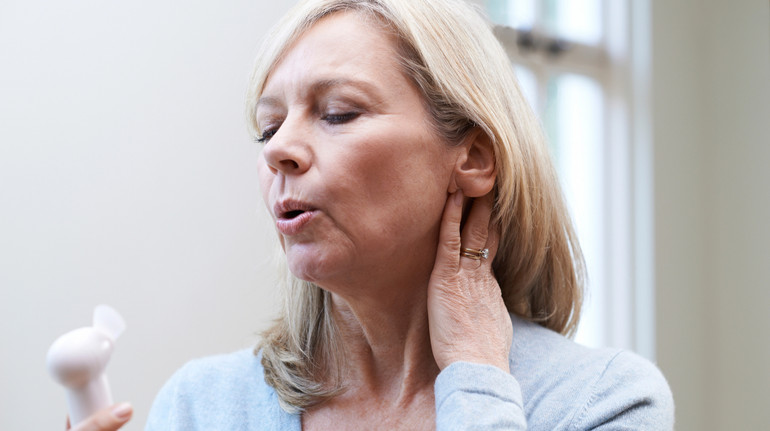“
 80% of women face hot flushes during menopause
80% of women face hot flushes during menopause
Photo: HighwayStarz/DepositPhotos
This was reported by the US Food and Drug Administration (FDA), informs CNN.
During menopause, the level of the hormone estrogen decreases in women. At the same time, the nerves in the hypothalamus become hyperactive in the brain – the area that is particularly responsible for maintaining body temperature.
Because of this, during menopause, more than 80% of women experience hot flashes – a feeling of intense heat that is often felt around the face, chest and head and can cause profuse sweating. Usually, such manifestations of menopause last a few minutes and can occur occasionally or many times a day.
Hormone replacement therapy is a treatment for hot flashes for many women, but it is not recommended for patients with co-morbidities or a history of certain diseases, including cancer.
“Treatment options are limited for those with moderate to severe vasodilation symptoms, including hot flashes, especially if they are unable or unwilling to undergo hormone therapy.
The destructive nature of these annoying hot flashes can significantly affect women’s daily lives both at work and at home. This highlights the urgent need for effective non-hormonal treatments.”says researcher and executive director of the North American Menopause Society Joanne Pinkerton.

The new drug elinzanetant, which will be sold in the US under the brand name Leynkuet, blocks brain chemicals responsible for hot flashes and night sweats. Medicines work on brain cells to reduce their ability to cause seizures.
The drug was tested in three phases of the study – 628 women were involved in the last phase. Patients who took the drug for 12 weeks noted a reduction in the frequency of vasomortic symptoms by more than 73%. Participants who took a placebo reported a 47% reduction.
The most common side effects were somnolence, fatigue, and headache. The study showed that the effect of elinzanentant was maintained for a year.
In 2023, the FDA approved the menopause drug fesolinetant, which also works as an alternative to hormone replacement therapy. Along with the new drugs, these agents are among the first to work through a newly described mechanism in the brain that is believed to control hot flashes.
Earlier, scientists found that the symptoms of menopause can make it easier swimming in cold water.

”, — write: www.pravda.com.ua
 80% of women face hot flushes during menopause
80% of women face hot flushes during menopause
Photo: HighwayStarz/DepositPhotos
This was reported by the US Food and Drug Administration (FDA), informs CNN.
During menopause, the level of the hormone estrogen decreases in women. At the same time, the nerves in the hypothalamus become hyperactive in the brain – the area that is particularly responsible for maintaining body temperature.
Because of this, during menopause, more than 80% of women experience hot flashes – a feeling of intense heat that is often felt around the face, chest and head and can cause profuse sweating. Usually, such manifestations of menopause last a few minutes and can occur occasionally or many times a day.
Hormone replacement therapy is a treatment for hot flashes for many women, but it is not recommended for patients with co-morbidities or a history of certain diseases, including cancer.
“Treatment options are limited for those with moderate to severe vasodilation symptoms, including hot flashes, especially if they are unable or unwilling to undergo hormone therapy.
The destructive nature of these annoying hot flashes can significantly affect women’s daily lives both at work and at home. This highlights the urgent need for effective non-hormonal treatments.”says researcher and executive director of the North American Menopause Society Joanne Pinkerton.

The new drug elinzanetant, which will be sold in the US under the brand name Leynkuet, blocks brain chemicals responsible for hot flashes and night sweats. Medicines work on brain cells to reduce their ability to cause seizures.
The drug was tested in three phases of the study – 628 women were involved in the last phase. Patients who took the drug for 12 weeks noted a reduction in the frequency of vasomortic symptoms by more than 73%. Participants who took a placebo reported a 47% reduction.
The most common side effects were somnolence, fatigue, and headache. The study showed that the effect of elinzanentant was maintained for a year.
In 2023, the FDA approved the menopause drug fesolinetant, which also works as an alternative to hormone replacement therapy. Along with the new drugs, these agents are among the first to work through a newly described mechanism in the brain that is believed to control hot flashes.
Earlier, scientists found that the symptoms of menopause can make it easier swimming in cold water.

